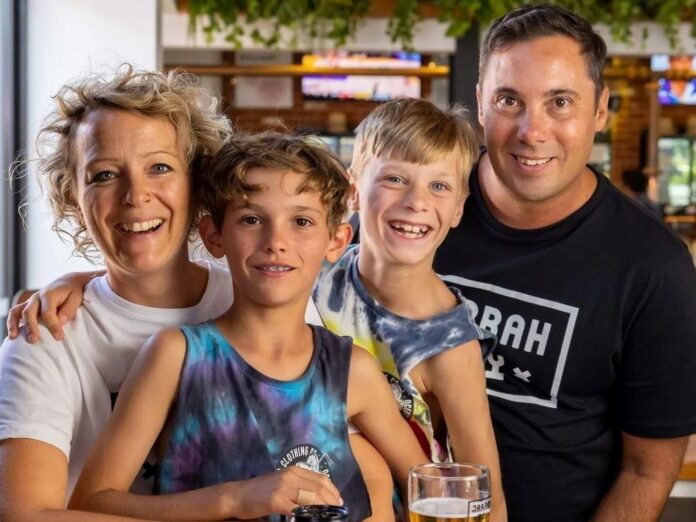One day soon, Dale Vocale is sure to look back on 2023 as a watershed year that took his Jarrah Boy beer from a “novelty” Indigenous product to a serious export prospect.
With a heritage from the Monero Ngarigo People of the Snowy Mountains, Dale, now based in Cooroy, and business partner and Kabi Kabi man Isaac Harrison have created all-Australian, bush foods-flavoured brews enjoyed the length and breadth of Australia.
From the seed of an idea three years ago, Jarrah Boy has become the first Indigenous alcoholic beer range to go national.
Being fair dinkum, telling their stories and building relationships through good old-fashioned face-to-face meetings has seen their products expand from just a handful of local stockists to the Endeavour Group’s 50-plus Dan Murphy’s and BWS stores in two states (Queensland and Victoria), lightly available in another two (NSW and Northern Territory), as well as prominent hotel chains – all in the first months of launching publicly.
Tirum Golden Sun Lager, Gwangal Red Lager and Bubul Ocean Ale are now in large-scale production, while exclusive and limited-edition recipes for new brews using bush foods are in ongoing development.
In June, Dale visited Singapore, at the invitation of the High Commission of Australia, as part of a contingent representing the first nine Indigenous companies to learn more about the exporting process and seek to actively sell their products in Asia.
SUBSCRIBE here now for our FREE news feed, direct to your inbox daily.
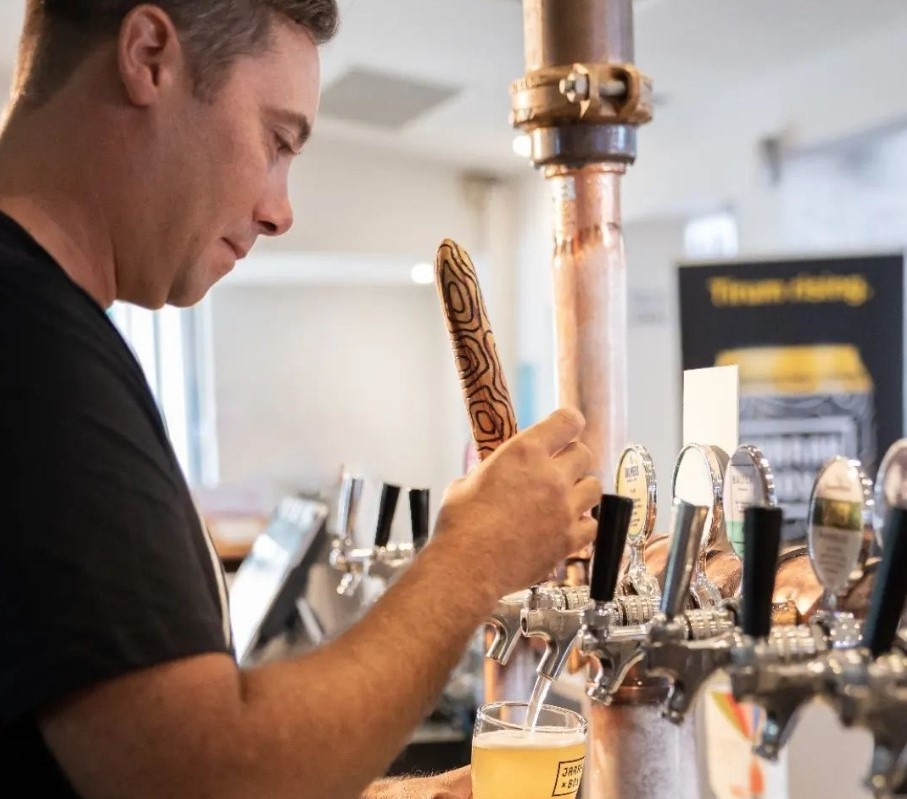
“When the time is right, I will re-engage and we will work on building a relationship,” he said of the Asian export prospects.
“We had partners who were very interested. It’s just a matter of me scaling up now and also being able to supply that as well.
“It doesn’t have to be huge. It can be as small as I want it to be to start with and build on that, just like we’re doing here (in Australia).”
Australia’s first official Ambassador for First Nations People Justin Mohamed, who leads the Office of First Nations Engagement in the Department of Foreign Affairs and Trade, is already a fan.
He was able to connect with the nine companies while they were in Singapore via live streaming on the big screen and, as Dale remembers, was “just blown away”.
Local journalists supporting local people. Help keep independent and fair Sunshine Coast news coming by subscribing to our FREE daily news feed. All it requires is your name and email at the bottom of this article.
Two months ago, Dale was invited to Uluru for the global launch of the Wintjiri Wiru shows at Uluru, as Voyages Ayers Rock Resort stocks Jarrah Boy.
“Jarrah Boy is right through their business up there,” Dale said.
“They love it and they support us. They move tons of beer a month.
“We’ve got some really good relationships going with these guys and the same with Accor hotels: Peppers Noosa, the Mantra in Mooloolaba, and we also sell at different functions at Novotel and Pullman hotels.
“It’s amazing to think that every Friday or Saturday night, people can now have a Jarrah Boy made with native bush foods.”
It was as an apprentice chef in the late 1990s that Dale first became passionate about Australia’s unique bush flavours, working alongside Indigenous chef Howard Armstrong and making anything from emu egg omelettes to kangaroo salamis and barramundi goujons in panko crumbs.
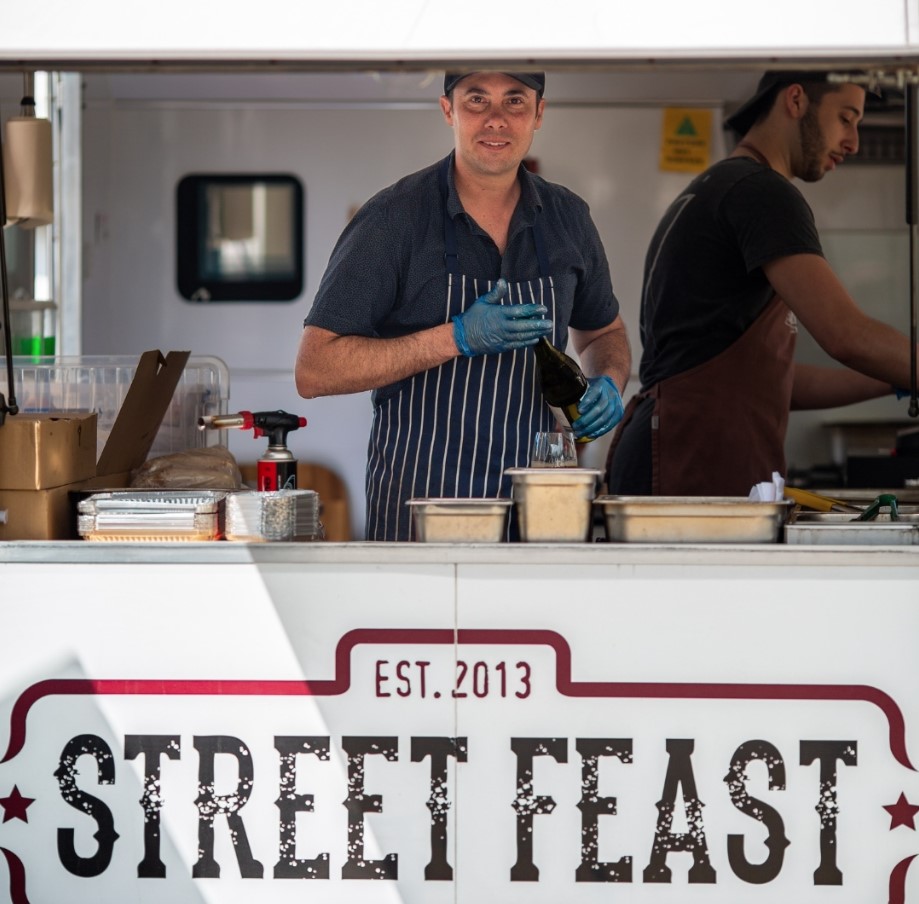
While senior chef at the Melbourne Convention Centre, Dale had an idea to introduce bush foods to the street food space.
He pioneered that through the food truck and catering business he ran over nine years – at a time when discerning foodies could only find those flavours occasionally on the menu of top-end restaurants or in Indigenous tourist areas such as Yalara in Central Australia.
His journey from food recipes to inspired brew concoctions is in no small part due to the memory of his beloved Nannagars (great grandmother).
She loved a beer and a yarn with her mates in an Orbost pub in the 1940s and ’50s, after a day in the fields picking vegetables for East Gippsland’s Italian families (her daughter married the son of one of those families, giving Dale’s father the Vocale name).
Each one of the Jarrah Boy beers has an Indigenous moniker as a nod to the partners’ heritage.
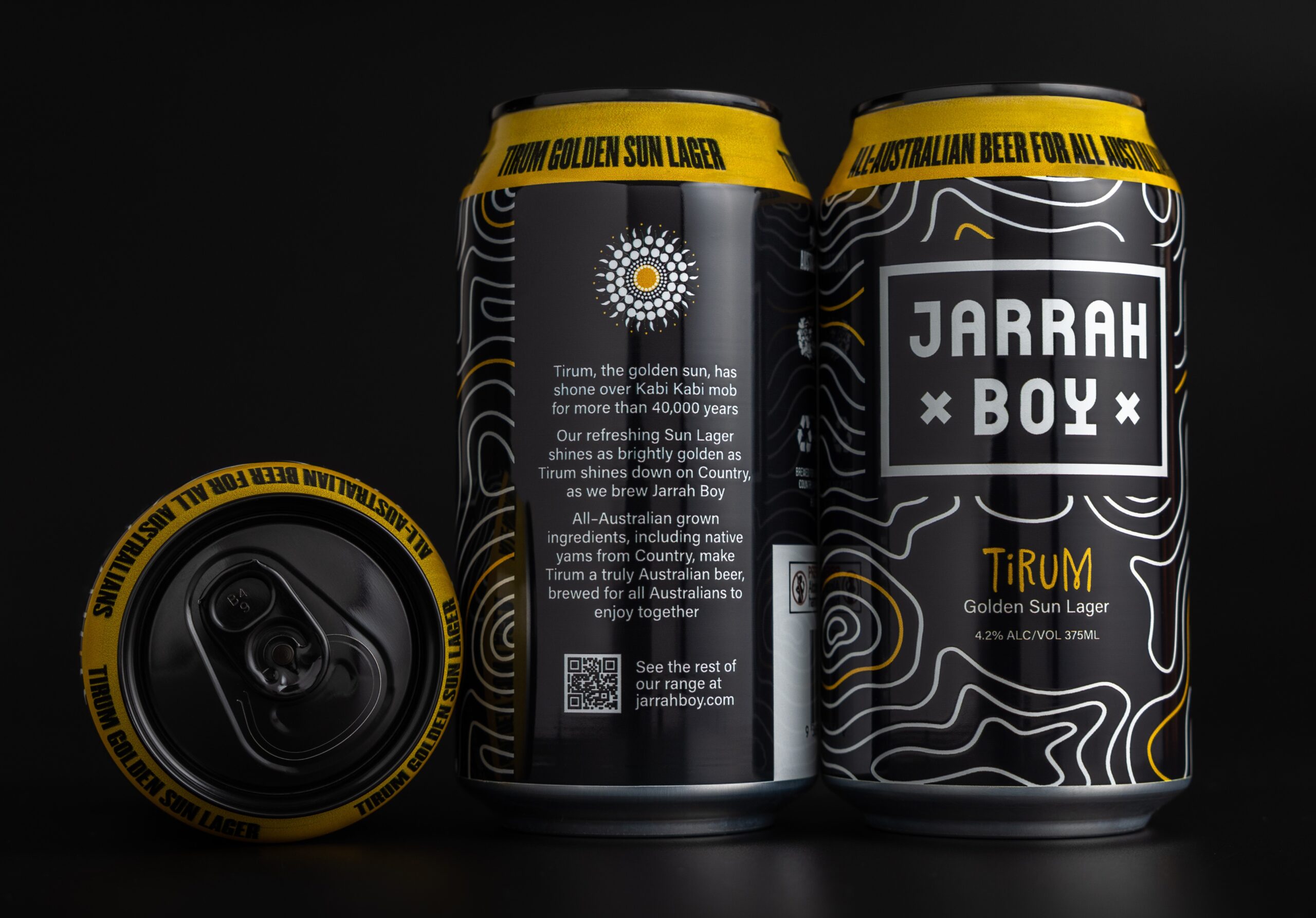
Tirum – the first to launch at Peppers Noosa Resort on October 20 last year and more widely stocked – is the Kabi Kabi word for the sun.
Just-released Gwangal means honey and Bubul (exclusive to Peppers Noosa Resort) is moving water in the First Nations language of Dale’s Nannagars.
“I’m heading down to Victoria next week for the week, doing a tour, popping into stores and going up to East Gippsland as well, where my mob’s from,” Dale said.
“We’re going to take Gwangal with us and launch that there as well and tell our story.
“Gwangal is our red earth lager and that is made with native honey.
“Nannagars called honey gwangal. I knew Nanna until I was, say, 13 or 14 years old and she spoke fluent Ngarigo language. We have a lot of that recorded.
“It’s great to be able to look back at our story, our history and bring that into a new, modern concept in different products. It’s just beautiful.”
Dale is particularly excited about the latest two creations: Mulu, available later this year, with a “top-secret ingredient”; and the new “fruity and very refreshing” Pacific ale-style Bubul.
“I’d been out and about, foraging and searching, and found some native bush foods called karkalla and samphire,” Dale said.
“The samphire is commonly known as sea asparagus. It gives a beautiful little salty profile to the ocean ale.
“Pig face is the other name for karkalla.
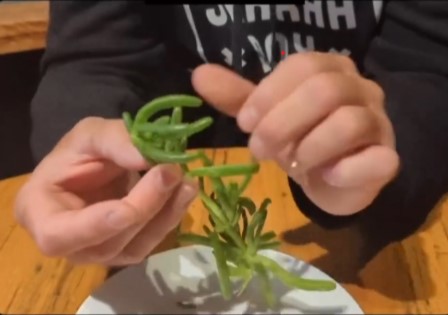
“These plants are edible. They’re succulents. So that’s something that can give you moisture.
“You could eat these things and they’ll give you the water that you need to survive on.
“And they’re nice to wrap around your fish and cook in the fire as well. They protect the fish and release a bit of salt into the fish.
“Me being a chef of 20 years, I’m thinking: ‘What else can I do with this stuff? These would be great to give it a bit of a salty profile into the ocean ale’.
“I’d heard of some awesome brewers around Australia that were putting seawater into their brew. I’m like, ‘OK, that’s pretty cool. What can I do that supports the supply chain?’.
“So, it was hand-foraged karkalla and samphire that I used.”
The cornerstone of Jarrah Boy is in supporting Australian hops and malt growers, as well as Indigenous farmers. It drives home that promise with its slogan: “An All-Australian beer for all Australians”.
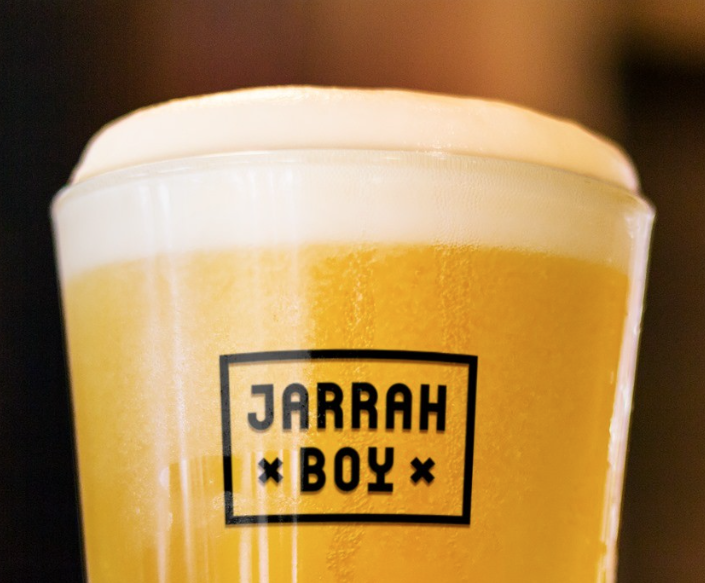
“I work really closely with Outback Academy which has a program that my business partner Isaac helped develop called the Follow The Flowers program,” Dale said.
“Follow The Flowers aims to restart something, replant something and follow that supply chain, keep building on it and just keep it moving forward.
“There is actually now bee keeping happening with an Indigenous mob. Bees buzz around, they pick pollen and do their thing and then they take it back to the main hive. Follow The Flowers is sort of the same thing.
“Outback Academy has about 15 to 20 Indigenous farms now with mob out there working and learning about farming – horticulture, agriculture and growing different native bush foods out where they are supposed to grow, native to that land, so they don’t suck so much of the water out of the rivers.
“And it’s really doing well in South Australia, Victoria, some WA and NSW. I’ve had a few meetings about starting a different mob and looking at what we’re going to be doing up here in Queensland.
“I use native yams, from West Arnhem Land, we have native honey (from Shepparton), we’re using Davidson plum – going forward with some test stuff there, and we’re working with some ideas on Kakadu plum.
“With that network … we’re looking for stuff that we want to grow on a larger scale to buy in volume.
“The limited-edition beers that I will make going forward is about supporting that supply chain.”
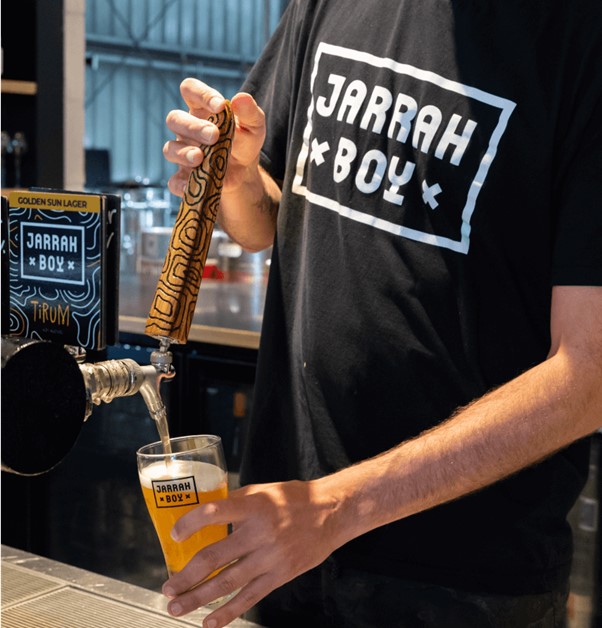
While Boiling Pot Brewing Co at Noosaville is where Dale started developing all his recipes and the first Tirum brew, the larger-scale batches are now being produced at Burnley Brewery Co in Dandenong, Victoria.
But the craft brewing fellowship he shares with Boiling Pot founder and Noosa local John Madill and master brewer Pedro Bevilaqua de Lucca continues.
“We don’t have a brewery or a spiritual home for Jarrah Boy as yet. I support Australian businesses by using their facilities: they’ve got vats and if they’re not cooking, they’re not making money.
“And they have awesome skills in canning and developing as well with the recipes.
“I keep developing up here. I work closely with Pedro with the recipes to make sure they’re done properly to the point where it all works into a larger scale.
“We’re hoping to have a brewery in Queensland soon that can do it as well. I’ve got one down in Victoria. We’re hoping to have one in other states so the beer’s always fresh.
“That’s the plan going forward until potentially we have our own brewery one day.
“I’m proud and I want to be recognised as an Indigenous business, but I also want people to see it as a business that makes great beer and a story close to the heart.”
Like stories about Sunshine Coast people doing great things? Help us deliver more by registering for our FREE daily news feed. All it requires is your name and email at the bottom of this article.


